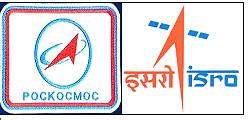 Russia and India Begin Space Cooperation
Russia and India Begin Space CooperationRussian today signed into law a pact with
Daily News Analysis, an Indian paper, reports on the recently concluded pact here:
The framework agreement signed in
After signing into law by president Putin, Indo-Russian space cooperation will acquire strategic character and would speed up joint collaboration in completing and operationalising the Global Navigational Satellite System (GLONASS) to end the monopoly of the Pentagon controlled US Global Positioning System (GPS), sources in the Russian Federal Space Agency Roskosmos said.
Russian News & Information Agency offers more details on the future GPS competitor:
"A Russian inter-departmental delegation will arrive in
Glonass, a Russian analogue of the United States Global Positioning System, is designed to allow both military and civilian users around the globe to receive signals from satellites to identify their positions in real time. It can also be used in geological prospecting.
They point to the strategically competitive nature of the venture:
Russia is expected to supply seven cryogenic upper stages to India, which originally wanted to buy the Russian technology to build the engines domestically, but
Working to cut its dependence on foreign launch vehicles,
The story, along with the many India-US nuclear deal posts, shows the stakes of technology diplomacy. Major powers, be they
Now how this technological diplomacy may affect proliferation concerns—whether space, nuclear, chemical, or biological—has yet to be determined.
But one thing is for sure-- the international community as a whole is not doing a good job formulating standardized rules for technology sharing. And is do doing bilatteral aggrements-- differing standards, poor verification, potenial secret agreements-- all come to the fore.
0 Comments:
Post a Comment
<< Home